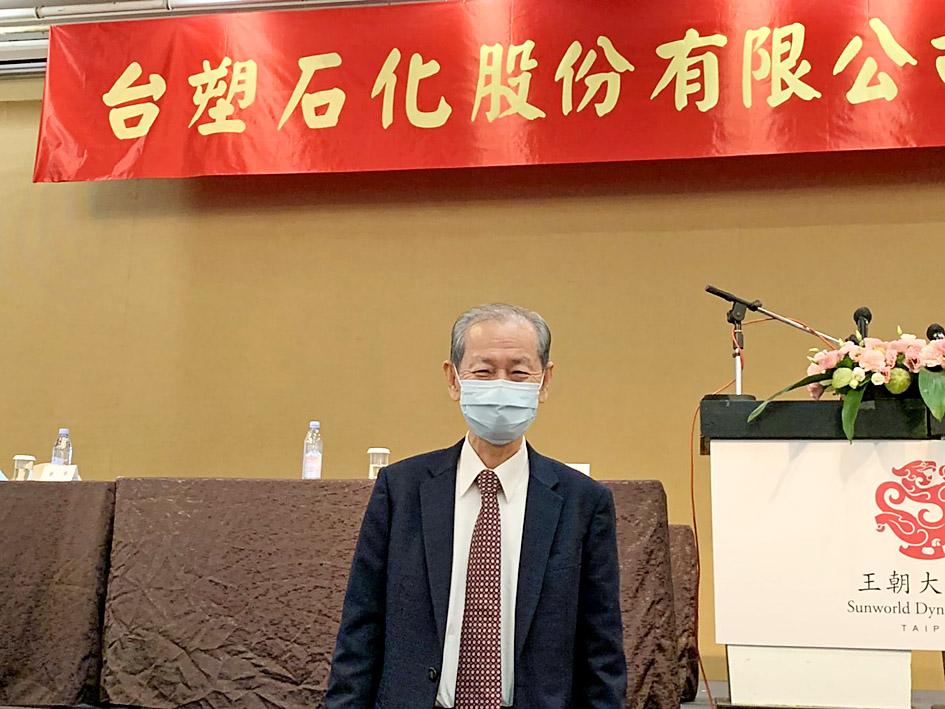A tanker seen at a refinery in Mailiao Harbor, Yunlin County, belonging to Formosa Petrochemical Corp (台塑石化) was delivering crude oil bought from Russia, the company said on Thursday.
As Western nations have stepped up sanctions on Russia over its invasion of Ukraine, local environmental groups have been calling for Formosa Petrochemical, one of the nation’s major oil refiners, to boycott Russian oil to avoid providing Moscow with any economic assistance.
In a post on social media on Wednesday, Air Clean Taiwan, an environmental protection organization, said the tanker NS Point transported up to 40,000 tonnes of oil that Formosa Petrochemical bought from Russia and had arrived in Mailiao harbor that night.

Photo: Chang Hui-wen, Taipei Times
The group called on the company not to unload the oil purchase.
Formosa Petrochemical spokesperson Lin Keh-yen (林克彥) on Thursday said that the tanker was transporting oil it bought from Russia, and that the company had to proceed with the purchase or risk breaching the contract it signed with a Singaporean company.
As the transaction was conducted under a commercial contract with the Singaporean company, unilaterally breaching the contract would result in heavy losses for Formosa Petrochemical, Lin said.
Given that Taiwan has not banned imports of Russian oil, the Singaporean company would be entitled to sue for compensation for its losses had the purchase been canceled for any reason other than force majeure — unforeseeable extraordinary events — he said.
Lin did not comment on the amount of oil on board the tanker, which departed on Thursday night after the shipment was unloaded.
Lin’s remarks are at odds with a statement by Formosa Petrochemical chairman Chen Bao-lang (陳寶郎), who in February said that the company had never imported crude oil from Russia.
Air Clean Taiwan and other groups urged people to wear yellow and blue outfits, the colors of the Ukrainian flag, and join a protest outside the company’s Mailiao refinery yesterday morning.

‘SWASTICAR’: Tesla CEO Elon Musk’s close association with Donald Trump has prompted opponents to brand him a ‘Nazi’ and resulted in a dramatic drop in sales Demonstrators descended on Tesla Inc dealerships across the US, and in Europe and Canada on Saturday to protest company chief Elon Musk, who has amassed extraordinary power as a top adviser to US President Donald Trump. Waving signs with messages such as “Musk is stealing our money” and “Reclaim our country,” the protests largely took place peacefully following fiery episodes of vandalism on Tesla vehicles, dealerships and other facilities in recent weeks that US officials have denounced as terrorism. Hundreds rallied on Saturday outside the Tesla dealership in Manhattan. Some blasted Musk, the world’s richest man, while others demanded the shuttering of his

Taiwan’s official purchasing managers’ index (PMI) last month rose 0.2 percentage points to 54.2, in a second consecutive month of expansion, thanks to front-loading demand intended to avoid potential US tariff hikes, the Chung-Hua Institution for Economic Research (CIER, 中華經濟研究院) said yesterday. While short-term demand appeared robust, uncertainties rose due to US President Donald Trump’s unpredictable trade policy, CIER president Lien Hsien-ming (連賢明) told a news conference in Taipei. Taiwan’s economy this year would be characterized by high-level fluctuations and the volatility would be wilder than most expect, Lien said Demand for electronics, particularly semiconductors, continues to benefit from US technology giants’ effort

ADVERSARIES: The new list includes 11 entities in China and one in Taiwan, which is a local branch of Chinese cloud computing firm Inspur Group The US added dozens of entities to a trade blacklist on Tuesday, the US Department of Commerce said, in part to disrupt Beijing’s artificial intelligence (AI) and advanced computing capabilities. The action affects 80 entities from countries including China, the United Arab Emirates and Iran, with the commerce department citing their “activities contrary to US national security and foreign policy.” Those added to the “entity list” are restricted from obtaining US items and technologies without government authorization. “We will not allow adversaries to exploit American technology to bolster their own militaries and threaten American lives,” US Secretary of Commerce Howard Lutnick said. The entities

Minister of Finance Chuang Tsui-yun (莊翠雲) yesterday told lawmakers that she “would not speculate,” but a “response plan” has been prepared in case Taiwan is targeted by US President Donald Trump’s reciprocal tariffs, which are to be announced on Wednesday next week. The Trump administration, including US Secretary of the Treasury Scott Bessent, has said that much of the proposed reciprocal tariffs would focus on the 15 countries that have the highest trade surpluses with the US. Bessent has referred to those countries as the “dirty 15,” but has not named them. Last year, Taiwan’s US$73.9 billion trade surplus with the US